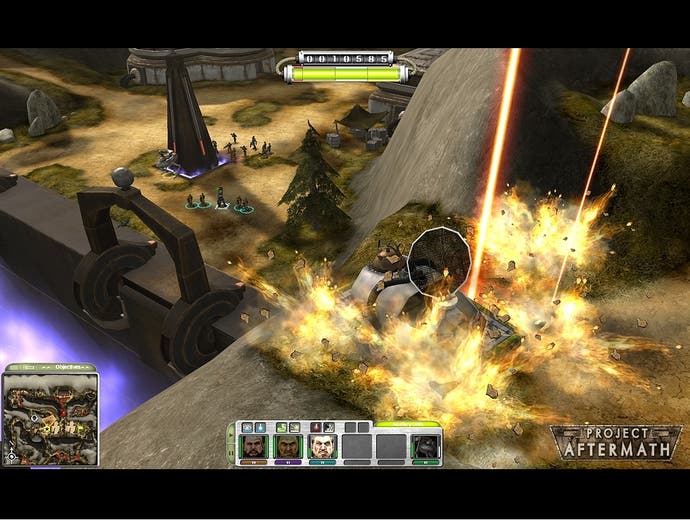Project: Aftermath
Aftermath you can count better.
But that's a conceptual problem. The bigger issues are far more practical. Let's talk controls. Right-click is generally reserved for contextual options, like swapping guns or formations, which leaves a lot of work for the old left mouse button. It's left-click to move. It's left-click to select. It's also - and this is where it gets iffy - left-click to choose targets. You're playing fairly zoomed-out (you need to know where reinforcements are coming from), so you're clicking and selecting teeny little guys. Mistakes are inevitable. You can only shoot when you're standing still, so if you click slightly to one side of the opposition, you go trundling off instead of firing; depending on where the click went you either move into firing range or you wander absently into theirs. This sort of low-level fogginess permeates the game and saps the fun.
Even so, this is only really problematic for a couple of reasons. First, the combat isn't actually that interesting even when it works - enemies stand there and shoot one another at a steady rate. Second, there are no mid-level saves.
The latter magnifies the problem with the iffy controls. You lose so much with a mistake - and mistakes are easier to make due to the game's clunkiness. There are all sorts of systems for accurate timing controls - for example, giving orders while on a pause, then pressing play to make your troops do their thing - but that's only pre-battle planning; the game doesn't let you pause the action. When you're wrestling with the control system, it's frustrating. For example, trying to throw down a turret in the middle of the action, wondering why it's not working while your men die, before realising that a "select what sort of energy you want your turret to fire" control has appeared away from the button.
It also magnifies the failings in the well-intentioned but actually experience-neutering GOOP system. When things go well, you don't care about your deaths, because you can always resurrect. When things are going badly, you find yourself in the position where using one of your special abilities fails the level by its associated cost. That filters back, so you deliberately avoid tactical options to maximise the amount of GOOP you have, thus minimising the chance you're going to battle through the entire level and fail anyway. It's a game that goes out of its way to actively punish you for experimenting with any of its mass of options - bar the aforementioned ones that aren't GOOP-powered. What's the point having a toolbox as big as this if you've got a GOOP-coloured "don't touch" sign on them?

But the biggest problem is really just boring old level design. I haven't completed the campaign - I got halfway through before deciding I couldn't face restarting level five again. First you sit through a fifteen-second, unskippable panning shot, before embarking on the design classic of a stealth section in an action game. The mission's based around a forced failure that removes your actual heroes, leaving you playing the fragile engineer, whose death is an instant mission-failure. Upon rescuing the heroes, it turns into an escort mission with respawning baddies and, at the point you rescue the first hero, you have to simultaneously set the hero fighting whilst evacuating the engineer safely. Except you can't plan for this on your first time through, because it's only the opening cut-scene that reveals the nature of the mission, and you won't know which hero you need to give the heal power to in order keep the engineer alive until you've unlocked him from the cell. At which point it's too late.
The whole thing is bewildering in a dozen ways. The game's just unlocked your third hero, the first new toy you've had for ages, and the mission that follows immediately removes all that from you. What were they thinking? Sadly it's typical. At its best, Project: Aftermath achieves mild boredom. At its worst, it caused my girlfriend to come and investigate cries of pain.
You know, occasionally I get accused of indie game favouritism. Next time anyone thinks of suggesting that, just remember this. I'll be trying to forget.
